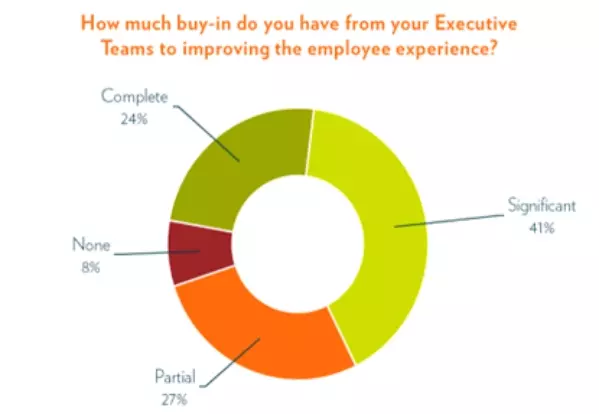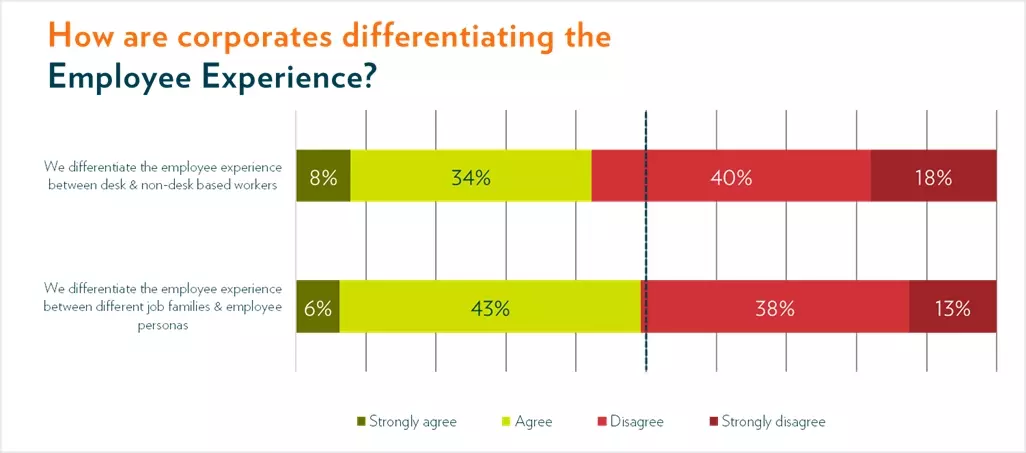Organisations need to prioritise employee experience, invest in HR technology, and bridge the gap between operations and HR to avoid the “Great Resignation 2.0”. In today's competitive labour market, employees have more options and are more likely to leave organisations that do not prioritise their needs. Next-generation People Operations solutions that integrate HR and operations can provide a seamless experience for employees, leading to improved communication, collaboration, and efficiency. By aligning HR and operations and creating a positive workplace culture, organisations can enhance their Employer Value Proposition (EVP) and retain and engage top talent for long-term success.
Employee Experience matters…
In today’s fast-paced business landscape, where disruption is the new norm, organisations are realising the critical importance of prioritising the employee experience. According to recent Fosway research1, 77% of organisations rate employee experience as “very important” to the success of their HR operations. At the same time, there is a significant commitment from the C-Suite to improve the employee experience, with 92% of corporates having some level of executive buy-in. And 65% of respondents to our research currently having complete or significant support for enhancing the employee experience.

Figure 1: Executive Buy-in to improving the Employee Experience - HR Realities Research 2022/23 Fosway Group.
However, when it comes to HR’s perception of the employee experience, there seems to be a disconnect. Only about half of HR organisations rate their employee experience as good or excellent, while the other half rates it as average or poor. This indicates there is room for improvement in how organisations view and address the employee experience. One area where this gap can be closed is in how organisations differentiate the employee experience based on the nature of work.
… and so do differentiated experiences…
When it comes to differentiating the employee experience, only 42% of organisations differentiate between desk-based workers and non-desk-based workers. However, 49% differentiate based on job families or employee personas. This shows that while some organisations recognise the need to tailor the employee experience based on different roles, there are many that do not differentiate the employee experience.
This lack of differentiation can lead to a disconnect between the expectations and needs of employees, resulting in a less than great employee experience.

Figure 2: Differentiation of Employee Experience – HR Realities Research 2022/23 © Fosway Group.
Most HR technology is struggling to deliver
One contributing factor to this gap is the state of HR systems. Less than one in three organisations agree that their HR systems are fit for the modern workforce, and 44% do not believe that their HR systems are up to the mark. This indicates that HR technology in organisations may be hindering rather than enabling their operations. When asked about the ability of their current HR solutions to support the desired employee experience, only 25% of organisations believe that their HR solutions can deliver the employee experience they want for their workers. Only 3% believe that their HR solutions exceed their needs in delivering employee experience, while a staggering 75% do not believe that their current solutions can support the desired employee experience.
Can People Operations solutions fill the gap?
To bridge this gap, organisations are turning to next-gen People Operations (People Ops) solutions that aim to transform HR administration into work execution. These mobile-friendly platforms serve as the primary channel for administrative functions, operational managers, and the workforce to interact. Corporates are leveraging these solutions to design and schedule operational tasks in the back office and then assign, execute, and document them across the workforce. This means that workers not only use People Ops platforms to view payslips, track work hours, and swap shifts, but also to execute work, self-serve answers to complex HR questions, and collaborate with their peers. Although the adoption of these solutions is still in its infancy, they have the potential to not only integrate People Operations into the flow of work but also become the next generation of flow-of-work platforms.
Despite the commitment to investing in HR technology, wider economic trends may slow down buying cycles and squeeze budgets. However, HR technology is foundational to innovating the employee experience and optimising the workforce. Therefore, solutions that offer shorter deployment timelines and faster speed to value are likely to be in higher demand.
Organisations that compromise on parts of their Employee Value Proposition (EVP) are at risk of experiencing a “Great Resignation 2.0”. In a recessive economy in which skilled talent remains scarce, connecting with employees emotionally, mentally, and financially is crucial to retaining them. Managers need to have a good understanding of potential financial challenges faced by their teams and better support the financial well-being of employees. This can provide a significant advantage in today’s competitive labour market, in which employees have more options and are more likely to leave organisations that do not prioritise their needs and provide a positive employee experience. To attract, retain, and engage top talent, organisations need to ensure that their HR and operations are aligned and working together towards a common goal of enhancing the overall employee experience.
Summary
In conclusion, closing the gap between operations and HR is crucial for improving business success, especially during times of accelerating business disruption. Organisations that prioritise employee experience, invest in HR People Ops technology, and differentiate the employee experience to different target audiences are more likely to succeed in retaining and engaging their employees. Next-generation People Ops solutions that integrate HR and operations can provide a seamless experience for employees, leading to improved communication, collaboration, efficiency and ultimately retention. By prioritising the employee experience and aligning HR and operations, organisations can enhance their EVP and create a positive workplace culture that fosters engagement, increased productivity, and long-term success.
[1] All data in this article is taken from Fosway Group’s HR Realities 2022/3 research.
Learn More
We have two on-demand webinars for you to learn more about the Fosway research and UKG People Operations technology.
Webinar 1: ‘Closing the gap between Operations and HR: The road to success’ - Fosway presents the above research and discuss People Operations technology.
Webinar 2: ‘People Operations Roundtable’ – Neil Pickering and Alex Scutt from UKG discuss People Operations technology and present example use cases for the benefits it’s delivering to people and organisations.
And, there is lots more insightful research and information freely available on the UKG People Operations page.
About Fosway
Fosway Group is Europe's #1 HR Industry Analyst focused on Next Gen HR, Talent and Learning. Founded in 1996, we are known for our unique European research, our independence and our integrity. And just like the Roman road we draw our name from, you'll find that we're unusually direct. We don't have a vested interest in your supplier or consulting choices. So, whether you're looking for independent research, specific advice or a critical friend to cut through the market hype, we can tell you what you need to know to succeed.
Talk to us today on +44 (0) 207 917 1870 or via [email protected], or visit us at www.fosway.com
